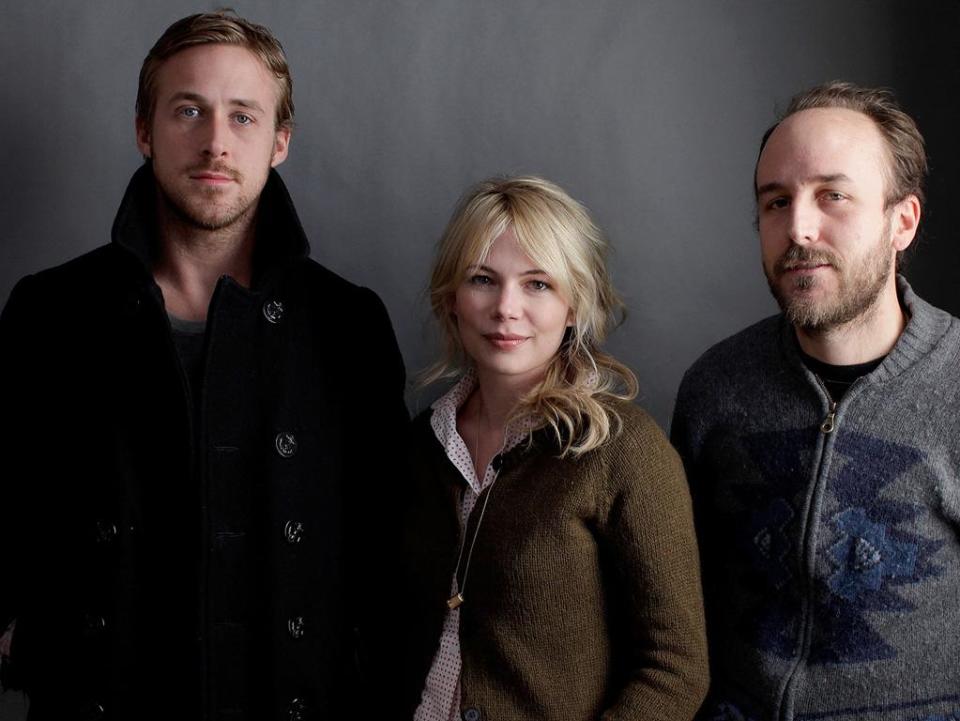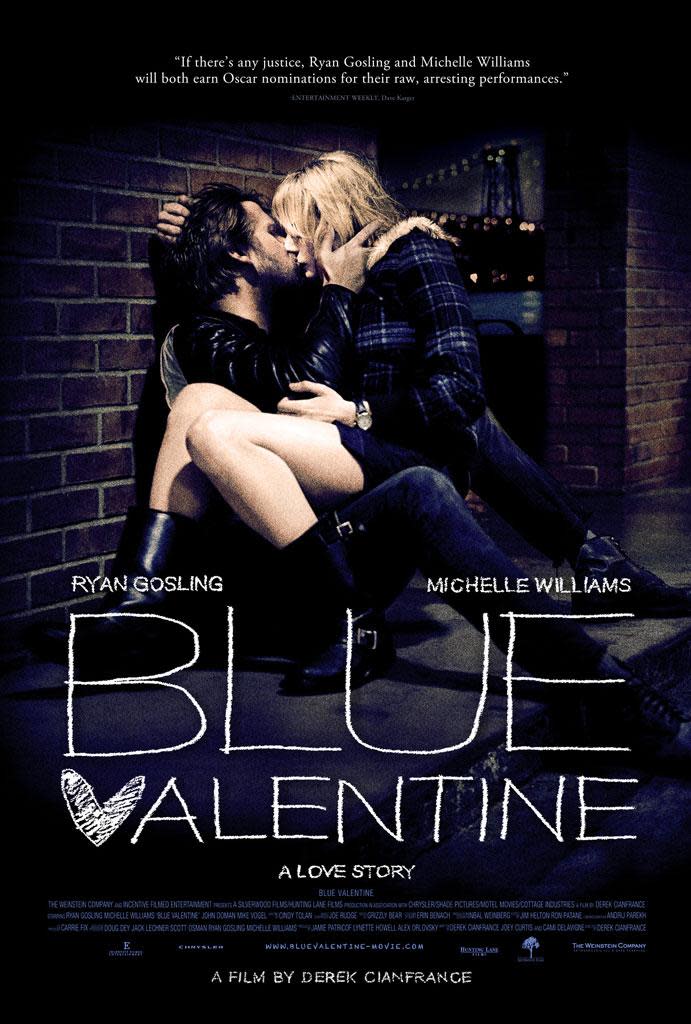NC-17 Flashback: Inside 'Blue Valentine's' Fight for an R Rating

It wasn’t the kind of movie you’d expect to court controversy. Blue Valentine, a raw and affecting drama about a young couple’s crumbling marriage, contained little in the way of sex or violence. But by the time Derek Cianfrance’s film was released in December 2010, it had endured one of the most famous ratings battles in movie history. Just weeks before it opened, the film was given an NC-17 rating by the MPAA ratings board. Thanks to a fierce fight from distributor Harvey Weinstein, the rating was changed to R, but the controversy had lasting repercussions — both positive and negative — for both Blue Valentine and its director. On the 25th anniversary of the NC-17 rating, Yahoo Movies spoke with Cianfrance and executive producer Jack Lechner (who calls the NC-17 rating “the best thing that ever happened to Blue Valentine”) about the film’s showdown with the MPAA.
Blue Valentine tells the story of Cindy (Michelle Williams) and Dean (Ryan Gosling), a pre-med student and high school drop-out, respectively, who fall in love in New York City. When Cindy discovers she’s pregnant, they marry and move to the country, where the pressures of everyday life erode their relationship. The movie cuts between the starry-eyed beginning of the couple’s affair and the bitter dissolution of their family, six years later.
Watch the Blue Valentine trailer.
“I just remember being shocked when we got the NC-17 rating, because I tried to make an adult film that was sensitive and that wasn’t exploitive of people. I just wanted to make something that was honest,” Cianfrance says. His commitment to Blue Valentine ran deep: He’d been trying to make the film for 12 years, with Lechner on board as an executive producer for much of that time. (By the time it was made, Blue Valentine had accumulated eleven producers, including both lead actors.) “From the very beginning of Blue Valentine, nobody wanted to finance it, and everybody wanted to act in it,” says Lechner, running through a list of actors who expressed interest over the years, including Rachel Weisz and Jeremy Renner; multiple cast members from Friends (“We could easily have made the David Schwimmer–Courteney Cox version of Blue Valentine,” Lechner jokes); Emily Mortimer; and even, briefly, Ryan Gosling and his Notebook co-star Rachel McAdams.
Finally, with Gosling and Williams on board, the film went into production in 2009. Cianfrance failed to find financing for his original vision, which involved shooting the two time periods of the film six years apart. He did, however, arrange to have his co-stars live in a house together for nearly a month in the middle of the chronological shoot, remaining in character as they staged fights, balanced a budget, and celebrated holidays with the young actress playing their daughter. That extra step created a palpable intimacy between the two actors that clearly separates the film’s time periods, and makes for a painfully realistic break-up. The movie opened to rave reviews at the Sundance Film Festival in January 2010, where it was acquired by the Weinstein Company and set for a December release.

Director Derek Cianfrance (right) at Sundance with Blue Valentine stars Ryan Gosling and Michelle Williams
Though Blue Valentine does contain two realistic sex scenes, neither is particularly risqué. No one involved had even considered the possibility that the MPAA would rate the film NC-17, so when Cianfrance got the news in October 2010, he was stunned. “I was at the Technicolor building and I had just watched the final print,” he recalls. “This was a 12-year journey, and I had just finished color-correcting it, sound-mixed the DCP, watched the 35-mm print, and I was going to go home, and my producer said, ‘I just got a text that we got an NC-17 rating.’” Cianfrance remembers feeling “violated,” and being furious that “violence has no limit anymore, but sexuality and intimacy — shown in this very truthful way that we were trying to do it in — all of a sudden was taboo.” He worried, with good reason, that his film would no longer be eligible to play in most theaters.
Lechner had a very different reaction. “Derek called, and was just distraught, saying, ‘What are we gonna do? What are we gonna do?’” the producer remembers. “And I said, ‘Derek, what you’re going to do is go to the liquor store and buy a bottle of champagne, because the movie is now worth millions of dollars more than it was yesterday.’”
The reason Lechner wasn’t worried was that he knew Harvey Weinstein. The co-founder of Miramax Films and the Weinstein Company had turned ratings disputes into free publicity for films like Clerks, Kids, and Fahrenheit 9/11. “You could just see the joy: For Harvey, it was like Christmas had come early that year,” says Lechner. “He hadn’t even asked for this one, and it just fell in his lap! But of course, once it did, he knew exactly what to do. And unlike many ratings controversies where you can make a fuss about it for publicity — but at the end of the day nothing’s going to happen — in this case, Harvey had a very solid case, because this movie should not have been rated NC-17.” (At press time, neither the MPAA nor the Weinstein Co. had responded to requests for comment.)
The ratings board isn’t forthcoming with the rationale behind their decisions, and years later, Cianfrance says he’s “still a bit blurry” on the details. All he knows is that the rating hinged on one, or both, of the sex scenes. The first takes place during the film’s happy earlier period, and shows Gosling performing oral sex on Williams for less than one minute, while both of them are fully clothed. The second is one of the movie’s darkest scenes, in which the older characters try — and fail — to have a passionate moment in a motel room. That second scene does involve some nudity, and also shows Gosling performing oral sex on Williams. The two moments were intended to mirror one another, in order to show how much the relationship had fractured by the end. As Cianfrance explains, the first scene is filmed in a single wide take, whereas the second is “very telephoto, very internalized… it’s about these two people just missing each other, and literally being separated through the edits of the construction of the scene.” In re-watching both scenes, Cianfrance says, “I couldn’t really find where I felt we crossed the line with them, except that they just felt intimate and they felt real.”
Based on other films that were initially rated NC-17 for mild sex scenes (like Boys Don’t Cry), Lechner believes that the MPAA’s issue with Blue Valentine was “female pleasure.” That seems to be the impression Ryan Gosling had, too. In an open letter to the ratings board, Gosling accused the MPAA of “supporting scenes that portray women in scenarios of sexual torture and violence for entertainment purposes,” while attempting to censor “a scene that shows a woman in a sexual scenario, which is both complicit and complex.” Williams also wrote a letter, saying that the MPAA’s decision “unmasks a taboo in our culture, that an honest portrayal of a relationship is more threatening than a sensationalized one.”
The controversy drew plenty of press coverage. Extra asked Ryan Gosling about the NC-17 rating on the red carpet. Trade papers like The Hollywood Reporter and Deadline published ongoing coverage, and the ratings battle also made headlines in mainstream media like USA Today, MTV News, and Ok! Magazine. So many outlets drew comparisons between Blue Valentine’s oral sex scenes and the more titillating Mila Kunis-on-Natalie Portman scene in Black Swan (released the same month, with an R rating) that Swan director Darren Aronofsky felt obliged to weigh in: “I’ve heard the Blue Valentine scene is more emotionally authentic,” he told the LA Times.
In the end, only two people were allowed before the rating appeals board, and Weinstein chose lawyer David Boies — who represented Al Gore in the Bush v. Gore 2000 election case and later helped overturn California’s Proposition 8 — to accompany him to the meeting. Over the course of an hour on Dec. 8, Weinstein and Boies laid out their case for an R rating. The board unanimously voted to change its decision. “For anything negative I ever felt about the MPAA, for their hypocrisy for accepting violence and not accepting human sexuality, all that became erased when they changed their verdict,” says Cianfrance. “Because they ultimately did the right thing.”

Had the MPAA upheld the NC-17 rating, Lechner believes that the film would have been released as it was, unrated. Cianfrance is less certain. “I don’t know what would have happened,” he admits. “We never honestly had the conversation about cutting it. And I give Harvey credit for that too, because it’s the rules of diplomacy: You don’t put anything on the table that you don’t want to lose.”
As it happened, the controversy helped the film find its audience when it was released on Dec. 29. Blue Valentine had a successful limited run in the United States and worldwide, and Michelle Williams went on to receive an Oscar nomination for her performance. “The NC-17 rating was almost certainly the best thing that ever happened to Blue Valentine,” Lechner says. “It became so much more attractive to audiences to think that there might be something sexy and taboo and forbidden about the movie, as opposed to just [a movie that] made you want to slit your wrists. I mean, look: This is why it took so long to get made. It’s the worst date movie ever. And now suddenly, it was a movie that people thought they might have some fun going to see.”
Cianfrance says that if the MPAA hadn’t reversed course, “I’d be angry to this day.” Even though he dodged that bullet, the experience of battling the NC-17 rating continues to affect the director’s films. His thoughtful use of violence in the 2013 drama The Place Beyond the Pines (starring Gosling and Bradley Cooper) was a reaction to his experience with the MPAA. Cianfrance is now in the process of editing The Light Between Oceans, a drama based on the Australian novel about a lighthouse keeper (Michael Fassbender) and his wife (Rachel Weisz) who find a shipwrecked baby. When asked if he worries about a possible NC-17 rating, the director admits that it’s been on his mind. “Yeah, because I’m working on a love story right now, and I want it to be true,” he says. “I think about it all the time.”
Images: The Weinstein Company, Jeff Vespa
This post has been updated.

